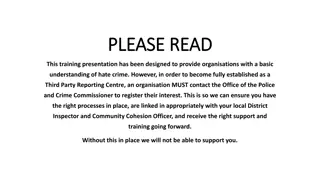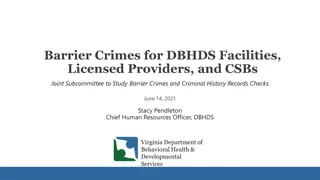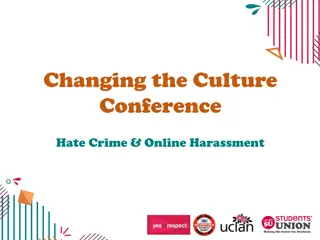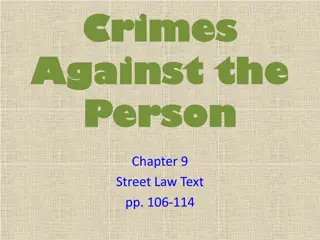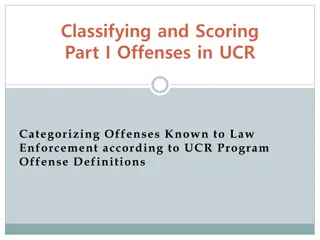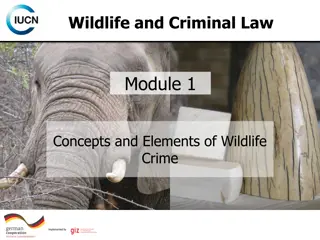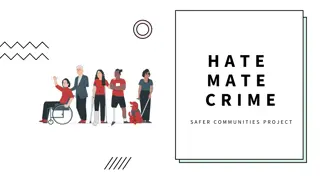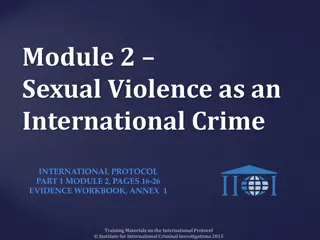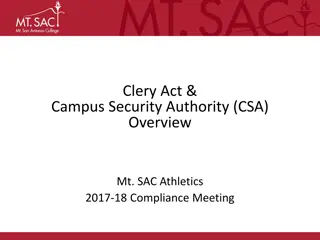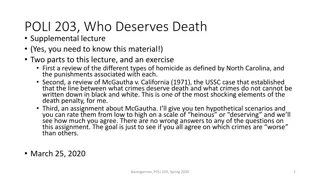
Understanding Crimes Against People
Explore various types of crimes against people, including homicide, criminal homicide, capital murder, manslaughter, and more. Learn about different categories of murder, like first-degree and second-degree, as well as the legal phases involved in the adjudication and sentencing of convicted murderers. Gain insights into voluntary and involuntary manslaughter, distinguishing between scenarios of voluntary manslaughter in heat of passion and criminal negligence leading to involuntary manslaughter.
Download Presentation

Please find below an Image/Link to download the presentation.
The content on the website is provided AS IS for your information and personal use only. It may not be sold, licensed, or shared on other websites without obtaining consent from the author. If you encounter any issues during the download, it is possible that the publisher has removed the file from their server.
You are allowed to download the files provided on this website for personal or commercial use, subject to the condition that they are used lawfully. All files are the property of their respective owners.
The content on the website is provided AS IS for your information and personal use only. It may not be sold, licensed, or shared on other websites without obtaining consent from the author.
E N D
Presentation Transcript
Homicide Homicide: the killing of another person Criminal Noncriminal Negligent The failure to exercise a reasonable amount of care in either doing or not doing something, causing the death of another
Criminal Homicide Capital murder First-degree murder Second-degree murder Felony murder Manslaughter Voluntary Involuntary (usually this is where negligent homicide falls)
Capital Murder TPC 19.03 Capital murder: intentional or knowing murder + aggravating factor Aggravating factors include: killing a peace officer; killing in the commission or attempted commission of kidnapping, burglary, robbery, aggravated sexual assault, arson, terroristic threat; killing while attempting to escape prison; killing while in prison; killing more than one person in the same criminal transaction; et al
Two Phases Guilt/Innocence: the adjudication phase The sentencing phase Jury must answer two questions: Do you find beyond a reasonable doubt that there is a reasonable probability that the convicted murderer will be a future danger to society? Are there sufficient mitigating circumstances that warrant sentencing the convicted murderer to life in prison instead of death?
Murder First-degree murder Deliberate, premeditated (more than just intent) malice aforethought lying in wait Second-degree murder With malice, but without premeditation or deliberation Intent: twinkle of an eye (think George Zimmerman) Felony murder
Manslaughter Voluntary manslaughter: heat of passion 4 scenarios that common law says a reasonable person may act from passion rather than reason Extreme assault and battery Mutual combat Serious injury of a close relative Sudden discovery of a spouse s adultery (???) Involuntary manslaughter: criminal negligence Drunk driving, the gasoline fight scene from Zoolander, etc.
Noncriminal Homicide https://www.youtube.com/watch?v=nJsbt- dgr84 Self defense Stand Your Ground laws
Problems Las Vegas shooter Homicide Cases p. 107 The Dying Cancer Patient p. 109 Assisted suicide/euthanasia Michelle Carter: http://www.cnn.com/2017/06/07/us/texting- suicide-massachusetts-trial/index.html When does bullying go too far? (Prosecution) National Suicide Prevention Lifeline: 1-800-273- 8255
Rape Some preliminary thoughts National Sexual Assault Telephone Hotline: 800-656-4673 (HOPE) RAINN Rape, Abuse, and Incest National Network The Rape Crisis Center for Children and Adults Consent: https://www.youtube.com/watch?v=fGoWLW S4-kU
Common Law Rape Common law: the carnal knowledge of a woman forcibly and against her will Force + no consent Force: resistance requirement OR threat of serious force (fewer cases, however) Takeaway: Saying No is not enough Is this good or bad policy?
MPC Sexual Assault 213.4 Sexual Assault: A person who has sexual contact with another not his spouse, or causes such other to have sexual contact with him, is guilty of sexual assault, a misdemeanor, if Gender Canon of Construction
MPC Rape MPC 213.1: A male who has sexual intercourse with a female not his wife is guilty of rape if: (a) he compels her to submit by force or by threat of imminent death, serious bodily injury, extreme pain or kidnapping, to be inflicted on anyone; or (b) [he drugs her without her knowledge]; or (c) the female is unconscious; or (d) the female is less than ten years old
Rape TPC Title 5 22.011: Sexual Assault: http://www.statutes.legis.state.tx.us/Docs/PE/ht m/PE.22.htm (is No good enough?) Reforms Prompt complaint rule abolished (BUT there s still a statute of limitations) Utmost resistance rule replaced by reasonable resistance Marital immunity one or two states retain; 24 abolished; rest of states have partial immunity Inquiries into victim s sexual history rape shield laws generally prohibit these inquiries
Rape Problems https://www.youtube.com/watch?v=5IJt-pHugdI Duke lacrosse scandal: https://www.youtube.com/watch?v=A4t3sEE3cMQ What does consent look like? Can consent be revoked? Should a victim s past sexual history be relevant in a rape/sexual assault prosecution? Problem 5.1 from my Evidence casebook (Rape Shield) Problems on p. 112
Protect Yourself Walk home at night in groups If you have to walk home alone, talk to a friend on the phone while you walk If you can t talk on the phone, then at the very least be sure to text a friend that you re leaving and where you re leaving from Pretend to be on the phone while you walk Try to walk in lit areas of the sidewalk/street
Protect Yourself If you have any doubts AT ALL that either you or your partner is too intoxicated to give affirmative consent, then don t have sex Know your limits, and respect other people s limits

![Prevention and Combating of Hate Crimes and Hate Speech Bill [B.9B.2018]](/thumb/60513/prevention-and-combating-of-hate-crimes-and-hate-speech-bill-b-9b-2018.jpg)


